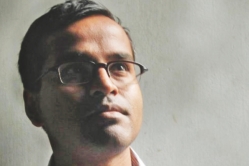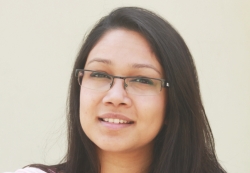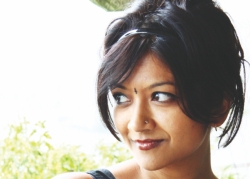
Hamim Kamrul Haq
Writer
Currently working in the Bangla Academy, 39-year-old Hamim Kamrul Haq wakes up as early as 4 am just so he has enough time to write another chapter before he is trapped in the four walls of his workplace for the rest of the day. “I wish I could have taken up writing as a career, but that's obviously not possible. At the same time I can't survive without writing,” he says.
 |
|
Photo:Courtesy |
A graduate of Jahangirnagar University, Haq started writing short stories in 2004. He however, came into the limelight in 2008 with his politically-motivated book, 'Raatri Ekhono Jog'. The book which is based on the dire political situation in 2006 focuses on the problems and protests that took place just before the emergency was declared.
“I like writing about mankind and life. Through my writings I try to understand life and answer life's intriguing questions,” replies Haq when asked about his preferred writing-subjects. Having worked in the media industry for a long time, Haq has published many of his short stories through the print medium. Perhaps one of the reasons behind that is his hesitance in releasing books during the ever popular festival, Ekushey Boi Mela. “I don't like bringing out books during the Boi Mela since there is always a hint of uncertainty regarding the release of the book. It may or may not come out,” he explains.
The writer whose latest book entitled 'Golaper Shiri' came out this year was influenced by writers across the boundaries, from Rabindranath Tagore to James Baldwin. However, like majority of Bengali writers, his biggest influence is Tagore.
A staunch supporter of the Bangladeshi writing community, Haq believes that the reading market in the country needs to expand in order to encourage people to take up writing as a profession. He also thinks that publishers should make longer deals with writers rather than the customary single-book contracts. “We should be able to sign more contracts with our publishers. Only then can we survive in this line of work,” he says.
Having said that, Haq however, believes that the position of writers in society has come a long way than before. “I have many friends -- engineers and doctors -- who tell me that they want to write novels, which is a great thing,” he says. Furthermore, Haq feels that there have been several changes in the writing world over the last decade in Bangladesh. One of which, he claims, is the release of novels written in English by Bengali writers.
When asked as to where he sees himself in the next ten years, Haq in a typical writer's fashion provided a romantic reply, “I want to enjoy life, enjoy every bit of air, every bit of sunlight and keep on writing. That's my aim in life.”
By Naimul Karim
Kanti Ananta Nuzhat
Researcher
 Bangladesh is a country filled with potential young people. Demographically, the majority of the population consists of young people who are working in the country or abroad, contributing to the benefit of the nation. Calling them the nation builders, we give them a new face and a new identity. Kanti Ananta Nuzhat, an Economist by profession, having completed her Masters in Economics from York University, Canada in 2009, and Masters and Bachelors in Economics from North South University, Bangladesh, she is currently enrolled in a PhD programme at Monash University, Australia with a Monash graduate scholarship. Nuzhat also received the Dean's award for this programme. Prior to this, Nuzhat also worked at North South University as a Lecturer and at BRAC as a researcher for a small period of time.
Bangladesh is a country filled with potential young people. Demographically, the majority of the population consists of young people who are working in the country or abroad, contributing to the benefit of the nation. Calling them the nation builders, we give them a new face and a new identity. Kanti Ananta Nuzhat, an Economist by profession, having completed her Masters in Economics from York University, Canada in 2009, and Masters and Bachelors in Economics from North South University, Bangladesh, she is currently enrolled in a PhD programme at Monash University, Australia with a Monash graduate scholarship. Nuzhat also received the Dean's award for this programme. Prior to this, Nuzhat also worked at North South University as a Lecturer and at BRAC as a researcher for a small period of time.
Nuzhat, an ambitious child since birth had always wanted to become an Economist, and her curious mind often led her to question many things around her. The disparity between the developed and the developing countries used to worry her from a young age and subsequently, she used to think how she could contribute to ease the differences.
Nuzhat's father, Professor Nazrul Islam, an eminent Urban Expert of Bangladesh, is the man behind her success. Her father's guidance and certain decisions regarding her education proved to be extremely effective in her life. The decision to choose Mathematics as a subject at school was something her parents imposed on her; this helped her immensely when she got into University, as Economics requires mathematics to a certain extent. Her father's saying, “If you want to compete in today's world, you need three things: good communication skills, mathematics and a computer,” always stuck with her. In addition, Nuzhat's active involvement with reading and other cultural activities helped shape her personality and her profession.
For Nuzhat, her academic achievement is her gift to her parents. On this journey towards success, Nuzhat only had to overcome a few trials and tribulations. With full support and co operation from parents who are supportive and liberal, Nuzhat had the option to study abroad in a scholarship programme.
Nuzhat's ambition is to pass on her achieved knowledge to the future generations, and hence she chose to become a teacher. What better way to serve her country! Even though she currently lives abroad for her education, she plans to come back, with hopes of resuming her duties as an academic. Additionally, she wants to carry on with her research work for the betterment of the economy. Nuzhat has the strongest desire that someday she will provide effective economic strategies for the leaders ruling our country.
Her hopes about Bangladesh are boundless. Bangladesh is already in the process of development. She is confident that the country's position will be elevated to a higher standard within the next ten years. For example, if the economic growth is around 7 percent annually, in ten years from now, it should double and we should reach the middle income group in the world. People's per capita income and living standard will rise. She foresees a much more export-oriented industrial development. Also through agriculture, she expects to see Bangladesh as a prime example, proving that a country can flourish by depending on both industry and agriculture.
In terms of socio-demographic context, Nuzhat wants to see that we achieve 100% literacy rate. There will hopefully be more human capital and skilled human resources so that population would not be a problem. Moreover, she wants to see progression in human rights, particularly for women and their empowerment. And eventually, she hopes there will be more powerful female leaders in the near future. In ten years time, Bangladesh should achieve democracy in its real sense.
Nuzhat feels her generation is collectively getting ready to embrace fresh challenges. She is certain that this generation will turn all problems into opportunities.
By Sumaiya Ahsan Bushra
Naushad Jamil
Poet
 |
|
Photo: Courtesy |
As a student of Politics, many would have expected the Mymensigh based writer, Naushad Jamil, to have written a series of novels on our country's ailing governmental practices. After all, the sector has endless fodder for any interested writer. Jamil, however, after his time at Jahangirnagar University, turned towards poetry. With his book of poems, entitled 'Tittho Tont', creating waves at last year's Boi Mela, Jamil's poems have been critically acclaimed throughout the country.
Inspired by the likes of Binoy Mazumdar and Selim Al Deen, Zamil pens rhymes that talk mostly about relationships and other related topics. “Writing poems is a passion and therefore you won't find my work related to my academic studies,” he claims.
His tryst with poetry started at a young age when a regional daily published one of his rhymes in one of its supplements. “Back then I never knew I could create rhymes, but my uncle who worked for that daily compelled me to submit a poem,” says Jamil. Although, nobody in Jamil's family follows a similar line of work, the writer credits his parents for helping him cultivate a reading habit which, he claims, helped his writing to develop. “I used to read a lot when I was a child since my parents encouraged me to.”
Jamil who currently works as a journalist for a Bangla Daily, claims that writing is still not a socially acceptable profession in Bangladesh. “If a person introduces himself as a writer, people often ask, as to what else he does,” says Jamil. He however, feels that with technological advancements the position of writers in society have come a long way. When asked if he targets a particular age-group, he says, “I write poems for myself. I gain a sense of inner peace while writing them. Anyone else who gets the same feeling is welcome to read them.”
He feels that more and more people in Bangladesh should be educated and encouraged to read, and that is the only way writers can expand their market in the country. “I think it will make a huge difference even if one crore Bangladeshis start reading books and newspapers.”
With an aim to include fiction-novels in his armory and to become a better writer in the near future, Naushad Jamil hopes to publish many more books and manage to spread his rhymes throughout the world.
By Naimul Karim
Shazia Omar
Writer
Shazia Omar grew up abroad but came to Bangladesh to finish her last two years of high school in Scholastica. She completed her under graduation from Dartmouth University, USA and her Masters in Social Psychology from LSE, UK. She worked for a year as an investment banker in New York before returning to Bangladesh hoping to make a difference.
 |
|
Photo: Zahedul I Khan |
Shazia's biggest inspirations were her mother and father. “My parents are incredible. My mother encouraged me to be positive and do things that I am passionate about, rather than chasing after money, while my father encouraged me to work hard to make a difference. They also enthused in me the love for Bangladesh, so much so that I came back, despite its traffic!" Shazia's novel, "Like a Diamond in the Sky," published by Penguin in 2009, portrays her feelings for Bangladesh, the feelings of disappointment and hope, the feelings she shares with her readers through vivid descriptions and lyrical prose. Shazia also founded a group called Writer's Block five years ago as a platform for other emerging Bangladeshi writers who write in English. She says, "My family, friends, colleagues, students and fellow writers at Writers Block are also a huge inspiration for me to keep at it."
Shazia is currently the Head of Advocacy at Shiree, a DFID project, which is a £65 million partnership between Bangladesh and UK. “Our goal is to lift 1 million people out of extreme poverty by 2015 through asset-transfers, skill development and advocacy.” Apart from this, Shazia teaches yogilates which is a fusion between yoga and pilates. She has been teaching for 7 years now at Club Amazon. She says, “I love learning about how the body, mind and spirit work, and I enjoy teaching because it allows me to stay fit while sharing what I love with others! Yogilates is a great way to improve one's well-being. For me, it is a must, as it helps me harness the energy necessary to balance family, career, passion and fitness, while staying sane, and happy!"
For Shazia, the biggest challenge is finding time. Her children, aged 2 and 4, are her top priority, but with the help of her "super hubby" and her family, she pulls through it all smoothly. When it comes to her poverty alleviation work at Shiree, she says, "Eradicating extreme poverty is not an impossible goal, but the challenge is to motivate all possible stakeholders: civil society, the Government, donors and the private sector, to do their part. Sometimes it almost seems as though we are not connected to a single driving vision." As far as writing is concerned, she says, "Unlike India, not many people here read in English. The main problem we writers face is the scarcity of readers!"
Shazia has high hopes for her family and country. She says, "I hope to do what I can to help the 1 million people climb out of poverty. I hope to learn more about the mind-body-energy link and hope to share what I learn with anyone who is interested, so that we can all bring a blissful balance to our hectic lives. I hope to write and encourage others to write so that Bangladesh is a force to reckon with on the literary map. And I hope to raise my children to love Bangladesh so that they add positively to their community."
As far as dreams for Bangladesh go, Shazia says, "A lot is already improving. People are active, motivated and enlightened. I hope they continue to spread the light. I can't wait to see a Bangladesh that is less polluted, more child-friendly, supportive of the underprivileged, thriving with inclusive businesses, lush with parks and libraries, and continuing to shine in the Arts."
By Naziba Basher